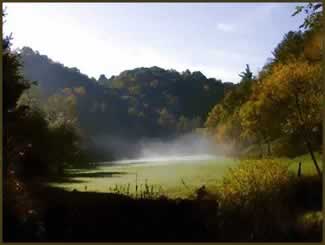Home and the Heart
 It is said that there are now over one million weblogs, or ‘blogs’ maintained and published around the world. I am coming to appreciate my place in a minority in that population, since I am among a very small number who write from the Appalachians. If we could see from near-space a map of where the purported million bloggers live, I wonder if it would not closely match those satellite images we have seen of North America at night. Where there are thick bands of dazzling light … in the cities, along the eastern seaboard, in college towns … there, too, are the bloggers. That leaves very few of us to represent the empty, black, unlit rural zones of the country. To assume that there is less here of life to write about would be an unfortunate misunderstanding.
It is said that there are now over one million weblogs, or ‘blogs’ maintained and published around the world. I am coming to appreciate my place in a minority in that population, since I am among a very small number who write from the Appalachians. If we could see from near-space a map of where the purported million bloggers live, I wonder if it would not closely match those satellite images we have seen of North America at night. Where there are thick bands of dazzling light … in the cities, along the eastern seaboard, in college towns … there, too, are the bloggers. That leaves very few of us to represent the empty, black, unlit rural zones of the country. To assume that there is less here of life to write about would be an unfortunate misunderstanding.
I am in yet a smaller minority, perhaps, in that not only is my physical presence in these southern Mountains. The Appalachians is also where my heart abides. I make my home here proudly, and by intention … a perspective I hope to flesh out in some fashion in my weblog in weeks to come. I don’t pretend to be or to expect to become an expert in mountain culture, geology, or the history of pioneer migration through this area. But I would like to gain more insight into ‘where I am’ in this world, physically speaking, and why. So, this theme will surface in my thinking from time to time,and I may share those thoughts with you.
Since not everyone who reads these words will be familiar with my home in the Appalachian Mountains, let me offer some helpful points to better acquaint you with the place.
There is a right way and a wrong way to pronounce Appalachian: “apul ach’chun” is correct. “apul aye’ chun” is incorrect. To be called by a name mispronounced is to impugn the identity that the bearer has with that name. Think about it. How do you feel if someone mangles your name? It is who you are. Call people by their proper names, and their lands also.
Realize that there is a difference between the social/cultural term ‘Appalachia’ and the Appalachian Mountains, proper. ‘Appalachia’ is a socioeconomic, cultural and geographically circumscribed term, with a history of pejorative overtones when used by outsiders. Those old stereotypes are giving way to more accurate understanding of who it is that lives in Appalachia in the 21st century. L’il Abner and Dukes of Hazard are not proper teachers anymore; they never were, but were accepted as such. I am not suggesting that one cannot still find archtypical Appalachian characters in these hills, even today. But they are disappearing in the obituaries every day, and their memories and way of life with them. Some old prejudices and unsavory habits should pass away, but there is much about Appalachia that deserves to live.
All southerners are not Appalachian. There is the lowland South and there is the Mountain South. I live by temperament and by choice in the latter, since my childhood on the very southern tailbone of the Appalachians on Red Mountain, in Alabama. I am curious to know how this nature of mine came about, and I suspect that these upland surroundings have had no small role to play with who I have become. The pull of the mountains may go back generations before I graced this planet; ancestral roots may have planted me where I have come to grow best.
I am blessed by strong sense of place, a bond of identify with the physical character and presence of the Appalachian Mountains, and for southwest Virginia, in particular. This attachment and preference has made for some difficult choices and circumstances in our lives. Living here, we have given up a certain amount of ‘convenience’ and proximity to ‘stuff’ of our culture. We have accepted the jobs that were offered here rather than chosing a job, and going wherever it required us to live. But I am living in the heart of God’s Country of rural Virginia, and this is my choice, and I am happy with it. I’d like to be able to make you understand why. I first have to find the answers for myself. And maybe that is what writing is ultimately all about.
Wendell Berry said it simply: if you don’t know where you are, you don’t know who you are.
A ten-point buck just wandered under my window as I was writing that last sentence, and the first snowflakes of the season are falling. I take this as a good omen that our wanderings through Appalachian lore will bring us to a pleasant or at least a reasonable destination. We have all winter to get there, and an infinite number of blank pages here on the computer screen.

